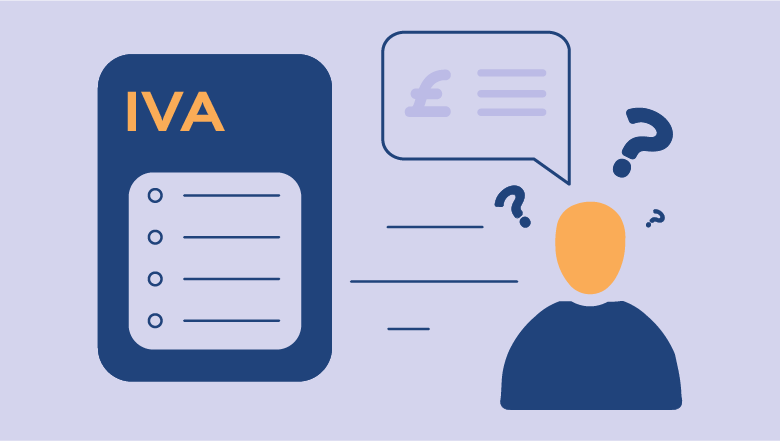Your read progress
What is an IVA and is it right for you?
7 minute read
Updated 17th September 2025 | Published 14th November 2022

As the cost of living crisis deepens, it’s becoming clear that debt issues are increasing across the country. According to our recent analysis*, Google searches for the term ‘help with debt’ and similar related terms have increased by 9% year-on-year.
In October alone, there were 30,660 searches of this nature, with the most common terms being ‘help with debts’, ‘charities that help with debt’ and ‘help with debt consolidation’. This is likely a reflection of the increasing number of people who are struggling to pay rent, utility bills, loans and credit cards.
There are a variety of options available to assist you with paying off your debts, and the best option for you will heavily depend on your circumstances. In this blog, we’re going to tell you everything you need to know about Individual Voluntary Agreements, to help you decide if it’s the best route for you.
What is an IVA?
An Individual Voluntary Agreement (IVA) is a legally binding arrangement set up between you and your creditors, to pay back your debts over a period of time. An IVA isn’t the only debt solution and it isn’t a quick fix to clear your debt. It is important to be informed and understand the options available to determine the best route for you.
An IVA can be used to pay off any amount of debt; there is no minimum or maximum amount but it is usually only recommended if you have debts with more than one creditor, as an IVA provides a way to consolidate your debts into one. There are certain fees associated with IVAs, so you should consider the amount you owe and decide if an IVA is the best route for clearing your debts; for amounts below £10,000, an IVA might not be the best choice.
IVAs are only available in England, Wales and Northern Ireland. Scotland’s alternative to an IVA is a Protected Trust Deed, with different benefits, risks and fees.
How does an IVA work?
Throughout an IVA, you will pay either fixed monthly instalments, a lump sum, or a combination of both, depending on your circumstances. The length of time you have an IVA will depend on your circumstances, but the standard term is five years. When setting up an IVA, you will work with an Insolvency Practitioner, who will determine how much you can afford to pay over what duration and then contact the creditors on your behalf.
By telling the Insolvency Practitioner about your income and outgoings, they will work out your monthly disposable income, which is the total amount left over after all of your outgoings. This amount is usually what you will agree to pay per month for the IVA. If your income changes at any point throughout the IVA period, either up or down, you must declare this to the Insolvency Practitioner, and your monthly repayments will change accordingly.
The Insolvency Practitioner will contact your creditors on your behalf to see if they agree with the terms of the IVA. The IVA will begin if the creditors holding 75% of your debts agree, even if those holding the other 25% have disagreed. Once the IVA has begun, assuming you make all of the agreed repayments, your creditors will not be able to take any further action against you or charge any extra interest on the amount you owe.
IVAs usually involve two fees: a one-off set-up fee and a handling fee charged on every payment. You will pay the Insolvency Practitioner the agreed amount on the agreed date, they will then take their handling fee before dividing the remaining amount between creditors.
Can debts be written off with an IVA?
The standard term of an IVA is five years (60 months), however, this can vary according to your circumstances. Depending on your amount of disposable income, you may not have paid off the entire debt within this term. In these cases, the remaining debt is cleared once the term ends.
For example: If you have a debt of £30,000 and your disposable income is £200 a month, you will pay £12,000 over the five-year term. The remaining £18,000 of the debt would be written off once the term is over.
However, if your income changes throughout the term of the IVA, your monthly payments will be adjusted accordingly. In these instances, you may end up paying more or less over the term than you’d expected to. The same applies if you come into a large sum of money, such as an inheritance, as you must legally declare this, and the Insolvency Practitioner is likely to claim this money towards the IVA.
What debts can be included in an IVA?
Most common debts can be included within an IVA, such as:
- Credit cards
- Personal loans
- Payday loans
- Council tax arrears
- Utility arrears
- Overdrafts
Some debts that cannot be included in an IVA are:
- A mortgage, and other loans secured against your property
- Student loans
- Magistrates court fines
- Child support
Can you pay joint debts within an IVA?
An IVA can only cover one person; it’s not possible to take out a joint IVA. There is an option for ‘interlocking’ IVAs, which are two individual agreements that are administered together, with both parties making one joint payment.
If only one person enters an IVA with a joint debt, the other is still responsible for the owed amount. If part of the debt is written off at the end of the IVA, the other person will be responsible for paying the remainder.
What are the implications of an IVA?
Any method of clearing debt has implications, and IVAs are no exception. It’s important to consider these before applying for an IVA so you know exactly what you’re signing up for.
With an IVA, your credit rating will be affected for at least six years from the date the arrangement is agreed - if the term is extended for any reason, the impact on your credit rating will also extend until the IVA is complete. If you complete the IVA early by paying off the entirety of the debts, it will still remain on your credit file until six years after the agreement date, however, it will be marked as ‘complete’. Although your credit rating is impacted throughout the term, having an IVA on your credit file shows lenders that you are making an effort to clear your debts.
During the IVA and for the three months after completion, you will be marked on the Individual Insolvency Register. This is a free, online register that anybody can view, however, it’s likely to only be seen by creditors. The information included on the register is your name, gender, date of birth, last known address and the date the IVA was approved.
The IVA can be cancelled if you do not keep up with the agreed repayments. If this happens the Insolvency Practitioner has the ability to make you bankrupt.
Entering an IVA could have an effect on your employment, depending on the sector you work in. It’s a good idea to check within your contract or speak to the HR department before agreeing to an IVA to be sure that it will not impact your job.
During an IVA, you must get permission from the Insolvency Practitioner if you want to take out any further loans. They may not accept your request, and even if they do, you cannot take out any loans over £500.
For buyers trying to get onto the property ladder, having an IVA can make it much harder to get a mortgage. For homeowners, you may be asked to release some equity from your property by remortgaging. This will never be higher than 85% of the value of the property. If you are unable to remortgage, the payment term of the IVA may be extended by an extra 12 months.
If you own a vehicle, the Insolvency Practitioner may have it valued. If they believe the vehicle is of an unnecessarily high value, you may be asked to sell it in order to pay towards the IVA. In this instance, you will be allowed an amount of the sale value in order to purchase a cheaper vehicle. If you own more than one vehicle, you must justify why to the Insolvency Practitioner, who may decide that the extra vehicle(s) must be sold to pay towards the IVA.
Steps to take before applying for an IVA
If you are struggling with debt, it’s important to talk to someone and see what help may be available. Most debt management companies offer free advice to help you make the best decision for your circumstances. An IVA is one of many options available for clearing debt. Check out our debt solution reviews to see genuine customers’ experiences with different companies before reaching out.
If you do decide to apply for an ICA, you will be asked to give details on your debts, and information to prove how much you can afford to pay. Be prepared with recent bank statements to prove both income and any savings, details of your mortgage or rent agreement, information about any assets you own and details of all of your debts and the creditors that you owe to.
Find further information on applying for an IVA from Citizens Advice.
Financial stress has a direct impact on your mental health. If you’re struggling with unmanageable debt, find free resources for support and advice here.
*Google searches extracted using Keyword Tool.

Written by Emma
Head of Marketing
Emma joined us in 2021. She is passionate about ensuring others make good choices with their money using all the information and data available.
As Featured By
Join our mission
We use the power of consumer reviews to help increase trust and transparency in financial services and to deliver industry leading insight and events.
Write a reviewExplore our other topics

News: Awards

News: Industry news

News: Smart Money People news

Guides: Smart money guides

Guides: Smart money tips


.png)
.jpg)
.png)
